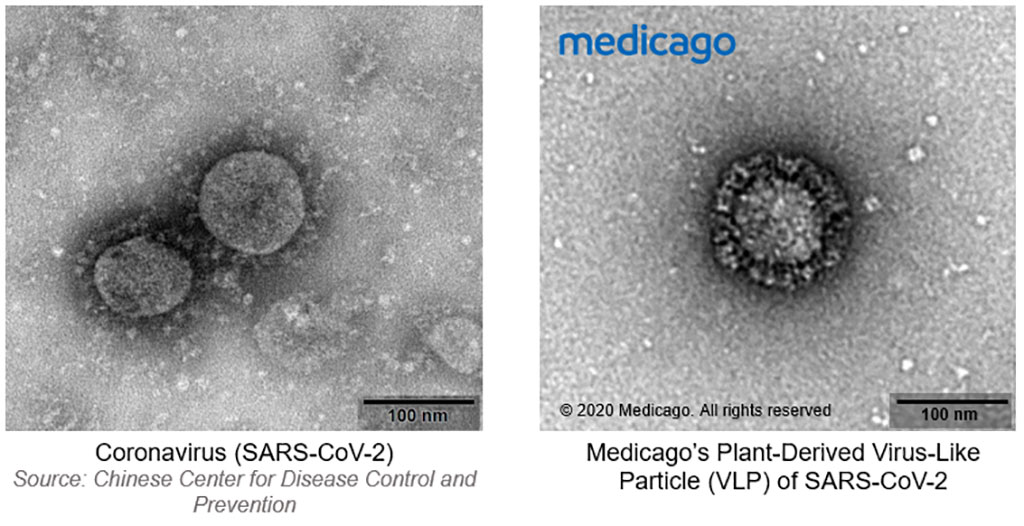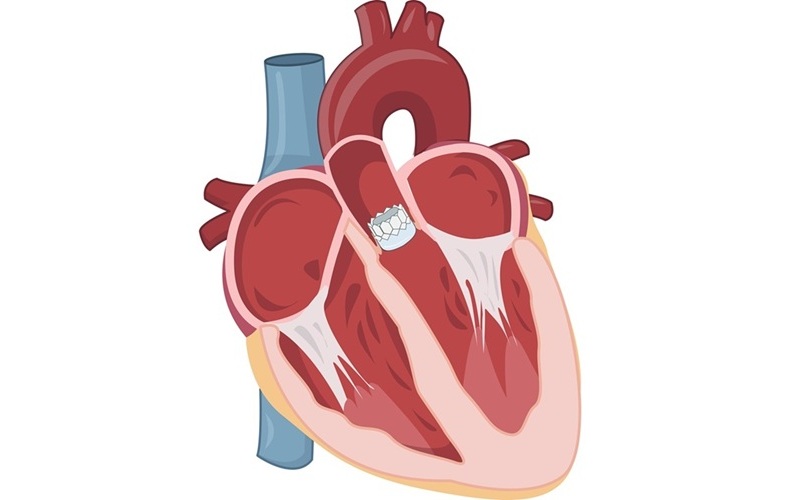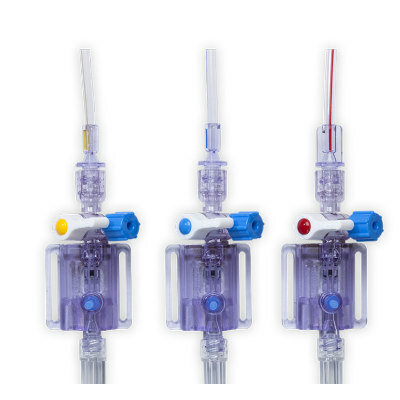Plant-Based Vaccine for COVID-19 Could Prevent Novel Coronavirus Spread
|
By HospiMedica International staff writers Posted on 24 Mar 2020 |

Image: Plant-based vaccine for COVID-19 could prevent novel coronavirus spread (Photo courtesy of Medicago, Inc.)
Medicago, Inc. (Quebec City, Canada), a biopharmaceutical company, has successfully produced a Virus-Like Particle (VLP) of the coronavirus just 20 days after obtaining the SARS-CoV-2 (virus causing the COVID-19 disease) gene. The production of the VLP is the first step in developing a vaccine for COVID-19 which will now undergo preclinical testing for safety and efficacy. Once this is completed, Medicago expects to discuss with the appropriate health agencies to initiate human trials of the vaccine by July-August 2020.
Medicago uses a proprietary plant-based technology to develop protein-based therapeutics. Unlike traditional vaccination development, the company does not use animal products or live viruses to create its products. Instead, it uses VLPs that mimic the shape and dimensions of a virus, which allows the body to recognize them and create an immune response in a non-infectious way. Clinical trial data suggest that VLPs have a multi-modal mechanism of action that is different from that of inactivated vaccines, activating both arms of the immune system – antibody and cell-mediated responses. Medicago’s proprietary technology is rapid, versatile, and scalable. As soon as the genetic sequence of a virus is made available, Medicago can develop a clinical-grade vaccine candidate in only a few weeks. Its recombinant technology allows the production of a vaccine that precisely matches the circulating strains, such as in the case of seasonal influenza. The technology is easily scalable, allowing the company to increase volume of production by simply increasing the number of plants it uses.
Medicago has previously demonstrated its capability as a first responder in a flu pandemic. In 2009, the company produced a research-grade vaccine candidate against H1N1 in just 19 days. In 2012, Medicago manufactured 10 million doses of a monovalent influenza vaccine within one month for the Defense Advanced Research Projects Agency (DARPA), part of the US Department of Defense. In 2015, Medicago also demonstrated that it could rapidly produce an anti-Ebola monoclonal antibody cocktail for the Biomedical Advanced Research and Development Authority (BARDA), part of the US Department of Health and Human Services. Medicago’s first product, a seasonal recombinant quadrivalent VLP vaccine for active immunization against influenza, is currently under review by Health Canada following the completion of a robust safety and efficacy clinical program involving over 25,000 patients.
Medicago is also using its technology platform to develop antibodies against SARS-CoV-2 in collaboration with the Laval University’s Infectious Disease Research Centre headed by Dr. Gary Kobinger, Professor in the Department of Microbiology and Infectious Diseases and the Director of the Infectious Disease Research Centre at Laval University, who helped develop a vaccine and treatment for Ebola. These SARS-CoV-2 antibodies could potentially be used to treat people infected by the virus.
“The pace of our initial progress in COVID-19 is attributable to the capability of our plant-based platform which is able to produce vaccine and antibody solutions to counteract this global public health threat. The ability to produce a candidate vaccine within 20 days after obtaining the gene is a critical differentiator for our proven technology. This technology enables scale-up at unprecedented speed to potentially combat COVID-19,” said Dr. Bruce Clark, CEO of Medicago.
“The collaborative efforts established between the research team at Laval University and Medicago have been very successful in developing unique antibodies against infectious diseases such as RSV and HMPV and that experience gives us confidence for successful identification of therapeutic antibodies against SARS-CoV-2,” said Dr. Gary Kobinger.
Related Links:
Medicago, Inc.
Medicago uses a proprietary plant-based technology to develop protein-based therapeutics. Unlike traditional vaccination development, the company does not use animal products or live viruses to create its products. Instead, it uses VLPs that mimic the shape and dimensions of a virus, which allows the body to recognize them and create an immune response in a non-infectious way. Clinical trial data suggest that VLPs have a multi-modal mechanism of action that is different from that of inactivated vaccines, activating both arms of the immune system – antibody and cell-mediated responses. Medicago’s proprietary technology is rapid, versatile, and scalable. As soon as the genetic sequence of a virus is made available, Medicago can develop a clinical-grade vaccine candidate in only a few weeks. Its recombinant technology allows the production of a vaccine that precisely matches the circulating strains, such as in the case of seasonal influenza. The technology is easily scalable, allowing the company to increase volume of production by simply increasing the number of plants it uses.
Medicago has previously demonstrated its capability as a first responder in a flu pandemic. In 2009, the company produced a research-grade vaccine candidate against H1N1 in just 19 days. In 2012, Medicago manufactured 10 million doses of a monovalent influenza vaccine within one month for the Defense Advanced Research Projects Agency (DARPA), part of the US Department of Defense. In 2015, Medicago also demonstrated that it could rapidly produce an anti-Ebola monoclonal antibody cocktail for the Biomedical Advanced Research and Development Authority (BARDA), part of the US Department of Health and Human Services. Medicago’s first product, a seasonal recombinant quadrivalent VLP vaccine for active immunization against influenza, is currently under review by Health Canada following the completion of a robust safety and efficacy clinical program involving over 25,000 patients.
Medicago is also using its technology platform to develop antibodies against SARS-CoV-2 in collaboration with the Laval University’s Infectious Disease Research Centre headed by Dr. Gary Kobinger, Professor in the Department of Microbiology and Infectious Diseases and the Director of the Infectious Disease Research Centre at Laval University, who helped develop a vaccine and treatment for Ebola. These SARS-CoV-2 antibodies could potentially be used to treat people infected by the virus.
“The pace of our initial progress in COVID-19 is attributable to the capability of our plant-based platform which is able to produce vaccine and antibody solutions to counteract this global public health threat. The ability to produce a candidate vaccine within 20 days after obtaining the gene is a critical differentiator for our proven technology. This technology enables scale-up at unprecedented speed to potentially combat COVID-19,” said Dr. Bruce Clark, CEO of Medicago.
“The collaborative efforts established between the research team at Laval University and Medicago have been very successful in developing unique antibodies against infectious diseases such as RSV and HMPV and that experience gives us confidence for successful identification of therapeutic antibodies against SARS-CoV-2,” said Dr. Gary Kobinger.
Related Links:
Medicago, Inc.
Latest COVID-19 News
- Low-Cost System Detects SARS-CoV-2 Virus in Hospital Air Using High-Tech Bubbles
- World's First Inhalable COVID-19 Vaccine Approved in China
- COVID-19 Vaccine Patch Fights SARS-CoV-2 Variants Better than Needles
- Blood Viscosity Testing Can Predict Risk of Death in Hospitalized COVID-19 Patients
- ‘Covid Computer’ Uses AI to Detect COVID-19 from Chest CT Scans
- MRI Lung-Imaging Technique Shows Cause of Long-COVID Symptoms
- Chest CT Scans of COVID-19 Patients Could Help Distinguish Between SARS-CoV-2 Variants
- Specialized MRI Detects Lung Abnormalities in Non-Hospitalized Long COVID Patients
- AI Algorithm Identifies Hospitalized Patients at Highest Risk of Dying From COVID-19
- Sweat Sensor Detects Key Biomarkers That Provide Early Warning of COVID-19 and Flu
- Study Assesses Impact of COVID-19 on Ventilation/Perfusion Scintigraphy
- CT Imaging Study Finds Vaccination Reduces Risk of COVID-19 Associated Pulmonary Embolism
- Third Day in Hospital a ‘Tipping Point’ in Severity of COVID-19 Pneumonia
- Longer Interval Between COVID-19 Vaccines Generates Up to Nine Times as Many Antibodies
- AI Model for Monitoring COVID-19 Predicts Mortality Within First 30 Days of Admission
- AI Predicts COVID Prognosis at Near-Expert Level Based Off CT Scans
Channels
Critical Care
view channel
Mechanosensing-Based Approach Offers Promising Strategy to Treat Cardiovascular Fibrosis
Cardiac fibrosis, which involves the stiffening and scarring of heart tissue, is a fundamental feature of nearly every type of heart disease, from acute ischemic injuries to genetic cardiomyopathies.... Read more
AI Interpretability Tool for Photographed ECG Images Offers Pixel-Level Precision
The electrocardiogram (ECG) is a crucial diagnostic tool in modern medicine, used to detect heart conditions such as arrhythmias and structural abnormalities. Every year, millions of ECGs are performed... Read moreSurgical Techniques
view channel
Bioprinted Aortas Offer New Hope for Vascular Repair
Current treatment options for severe cardiovascular diseases include using grafts made from a patient's own tissue (autologous) or synthetic materials. However, autologous grafts require invasive surgery... Read more
Early TAVR Intervention Reduces Cardiovascular Events in Asymptomatic Aortic Stenosis Patients
Each year, approximately 300,000 Americans are diagnosed with aortic stenosis (AS), a serious condition that results from the narrowing or blockage of the aortic valve in the heart. Two common treatments... Read more
New Procedure Found Safe and Effective for Patients Undergoing Transcatheter Mitral Valve Replacement
In the United States, approximately four million people suffer from mitral valve regurgitation, the most common type of heart valve disease. As an alternative to open-heart surgery, transcatheter mitral... Read morePatient Care
view channel
Portable Biosensor Platform to Reduce Hospital-Acquired Infections
Approximately 4 million patients in the European Union acquire healthcare-associated infections (HAIs) or nosocomial infections each year, with around 37,000 deaths directly resulting from these infections,... Read moreFirst-Of-Its-Kind Portable Germicidal Light Technology Disinfects High-Touch Clinical Surfaces in Seconds
Reducing healthcare-acquired infections (HAIs) remains a pressing issue within global healthcare systems. In the United States alone, 1.7 million patients contract HAIs annually, leading to approximately... Read more
Surgical Capacity Optimization Solution Helps Hospitals Boost OR Utilization
An innovative solution has the capability to transform surgical capacity utilization by targeting the root cause of surgical block time inefficiencies. Fujitsu Limited’s (Tokyo, Japan) Surgical Capacity... Read more
Game-Changing Innovation in Surgical Instrument Sterilization Significantly Improves OR Throughput
A groundbreaking innovation enables hospitals to significantly improve instrument processing time and throughput in operating rooms (ORs) and sterile processing departments. Turbett Surgical, Inc.... Read moreHealth IT
view channel
Printable Molecule-Selective Nanoparticles Enable Mass Production of Wearable Biosensors
The future of medicine is likely to focus on the personalization of healthcare—understanding exactly what an individual requires and delivering the appropriate combination of nutrients, metabolites, and... Read more
Smartwatches Could Detect Congestive Heart Failure
Diagnosing congestive heart failure (CHF) typically requires expensive and time-consuming imaging techniques like echocardiography, also known as cardiac ultrasound. Previously, detecting CHF by analyzing... Read moreBusiness
view channel
Expanded Collaboration to Transform OR Technology Through AI and Automation
The expansion of an existing collaboration between three leading companies aims to develop artificial intelligence (AI)-driven solutions for smart operating rooms with sophisticated monitoring and automation.... Read more



















